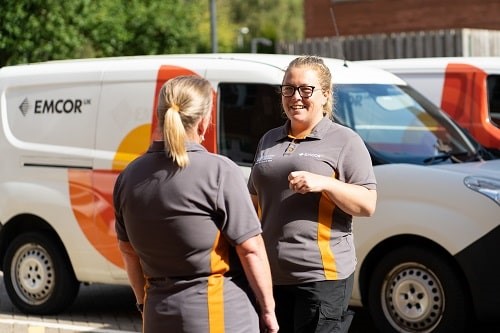EMCOR UK invests heavily in supporting the mental wellbeing of its staff, and was the first company in the world to be accredited under the new ISO 45003 standard for managing psychosocial risks at work.
Features
Putting mental wellbeing at the heart of a business
In the CIPD’s latest health and wellbeing survey, published in October 2021, 37 per cent of respondents said that stress-related absence had increased in the past year, while the ONS reports that 21 per cent of adults experienced some form of depression
in early 2021 – more than double the number observed before the pandemic (10 per cent). As well as sickness absence, poor mental health at work can lead to increased staff turnover, reduced engagement and high presenteeism.
At EMCOR UK, we decided to transform our wellness strategy in October 2020 to ensure positive mental wellbeing was treated with the same respect as physical health. This approach is in concert with the intentions of the ISO 27500 framework for a human centred organisation, with activity focused upon a whole person approach to safety.
 Photograph: EMCOR
Photograph: EMCOR
A key evolution of our wellbeing strategy has been our pursuit of ISO 45003, adopted by BSI in its capacity as the UK national standards body.
Psychological health and safety at work
ISO 45003 is the first global standard providing practical guidance on managing psychological health and safety in the workplace. In essence, it exists to help organisations of all shapes and sizes that use or are looking to adopt an occupational health and safety management system, based on the ISO 45001 Occupational Health and Safety Management standard.
In 2021, EMCOR UK became the first organisation in the world to be certified against BSI’s new scheme based on the international standard ISO 45003: 2021 Occupational health and safety management – psychological health and safety at work – Guidelines for managing psychosocial risks.
The process of obtaining the standard has sharpened our approach to psychological safety, one which is now underpinned by a data-driven risk assessment approach that aims to shift the dial from promotion to prevention. Indeed, to achieve ISO accreditation it was essential to demonstrate what EMCOR UK was actually doing, not just saying what it was doing, and to be able to measure the impact both quantitatively and qualitatively.
In order to obtain ISO 45003, all senior leaders and line managers had to recognise the importance of psychological safety, identify local risks and implement local control measures to mitigate against those risks.
In addition to the management of psychosocial hazards like job demands and role autonomy, EMCOR UK has continued to support individual development and awareness through a series of innovative, company-wide programmes.
Many of these programmes are new and demonstrate the continued evolution of our wellbeing strategy. They include various mental health awareness activities designed for employees, including:
- THRIVE Mental Health & Wellbeing Training – a wide-reaching course for all employees
- See Her Thrive Menopause Awareness Webinar and Workshop
- Women’s Health Network – held every month
- Rising Vibe Men’s Health Webinar and Workshop
- BOOST programme – eight weeks/sessions including yoga, breathing work, journaling, singing and mindfulness.
Evidence of improved mental health support
EMCOR UK has established 17 wellbeing KPIs which are routinely measured and assessed against a maturity model which ranks how successful activities are. Over the past 12 months, our total overall score has increased by 12.5 per cent.
 Jonathan Gawthrop, Executive director, wellbeing sustainability & assurance at EMCOR UK
Jonathan Gawthrop, Executive director, wellbeing sustainability & assurance at EMCOR UK
Versus 2019 figures, absence due to stress/mental health has fallen by 32 per cent, with 341 employees receiving counselling and advice across a range of wellbeing issues between March 2021 and February 2022. Meanwhile, 84 per cent of our workforce are engaged in our FLEX benefits and wellbeing platform, and our engagement score climbed from 65 to 67 in 2021.
In addition to this quantitative evidence, we have received consistent feedback from our employees on the benefits of the programmes they have taken part in. Examples include:
- “A very informative session. I am grateful to be able to learn more each day to support my coping mechanisms both in and outside of work.”
- “I can’t tell you how powerful that hour was, and for everyone at the end to start to talk and share. I’m so proud to work for a company that cares and is prepared to show it.”
Advice for obtaining ISO 45003 certification
The process for adopting ISO 45003 requires detailed planning and commitment and the implementation of a ‘plan, do check, act’ cycle. Organisations working towards accreditation may find it easiest to split the process across two fundamental stages.
The first stage involves developing a framework which supports psychological health and safety in the workplace. At EMCOR UK, this essentially included creating a five-year wellbeing strategy, in 2019, with clear objectives, implementation plans and measurement using a wellbeing maturity model.
Crucially, we had to make sure we properly integrated psychosocial risk identification and controls within existing systems, processes, policies and procedures, taking into account the centralised and localised nature of our company’s operating model.
Furthermore, this framework has been the springboard for launching various measures to create a supportive environment for employees, which so far has featured awareness campaigns, education workshops, promotion of self-management of wellbeing, and line manager support in managing mental health in the workplace. In January 2021, we launched our Mental Health Charter to encourage all colleagues to discuss mental health and wellbeing issues at work and proactively access the education, help and support available to them.
The second stage is all about distributing central wellbeing activity and initiatives through a network of local wellbeing champions and operational wellbeing leads.
These activities vary in scope, but typically include training and awareness on mental health risks, sessions and support on key wellbeing topics such as nutrition, sleep, menopause, men’s health, diversity and inclusion, and creation of mental health guides and action plans. Such plans, it is intended, will result in colleagues choosing to proactively use occupational health, employee assistance and mental health support services.
A major learning of the ISO certification process has been that it is vital to demonstrate tangible evidence of what you are doing – authenticity is critical and requires laying out evidence and data at every step. That data is used to identify risks which are acted upon and then evaluated.
Ensuring mental health support remains a priority
The very nature of the plan, do, check, act cycle means that continuous improvement is embedded into our wellbeing strategy.
A key objective moving forwards is to further embed ISO 45003 and the management of psychological health and safety at work within all central and operational functions to ensure a preventative and proactive approach to intervention. A key part of this will be the company-wide roll-out of a psychological risk management tool.
More generally, we aim to achieve parity between physical and psychological safety through our ‘Be There for Life’ model, expanding on what we have already achieved since 2019. This involves the integration of psychological and physical safety dashboards, to inform root cause analysis and decision-making, and using data to underpin our actions as part of an evidence-based approach.
We will also be expanding activity to educate and encourage our employees to adopt a proactive approach to mental health – both their own and that of their colleagues. This will entail an increased number of workshops, team talks, networking and training, as well as increased use of line manager referrals to the employee assistance programme, mental health support service and occupational health provision.
Finally, we also want to expand our Wellbeing Champion initiative. These colleagues play an important role in delivering a better world at work and support the integration of operational wellbeing. Here, we will be providing enhanced training and wellbeing appraisal objectives, as well as growing the number of Wellbeing Champions across the organisation.
We were proud to be the first company in the world to achieve ISO 45003 accreditation and intend on continuing to be a leader in positive mental health and wellbeing approaches, and a whole person approach to safety.
For more information see:emcoruk.com
Jonathan Gawthrop is executive director, wellbeing sustainability & assurance at EMCOR UK
FEATURES

Sedentary working and how to combat the ‘sitting disease’
By Gavin Bradley, Active Working on 05 April 2024
Prolonged and excessive sitting poses a major risk to our health, but the Get Britain Standing campaign and On Your Feet Britain Day on 25 April are a great way of encouraging workers to sit less and move more.

Company culture and wellbeing: a crucial link
By Bex Moorhouse, Invigorate Spaces on 05 April 2024
Investing in measures to support worker wellbeing will be ineffective unless the company culture genuinely incorporates values like teamwork, involvement, flexibility and innovation.

Office design and culture: happier and healthier staff – or the opposite?
By Guy Osmond, Osmond Ergonomics on 03 April 2024
Applying ergonomic principles to workstation set-ups and ensuring the physical environment supports neurodivergent people are just some of the ways of creating an office where everyone can thrive, but a supportive and positive organisational culture is vital too.


